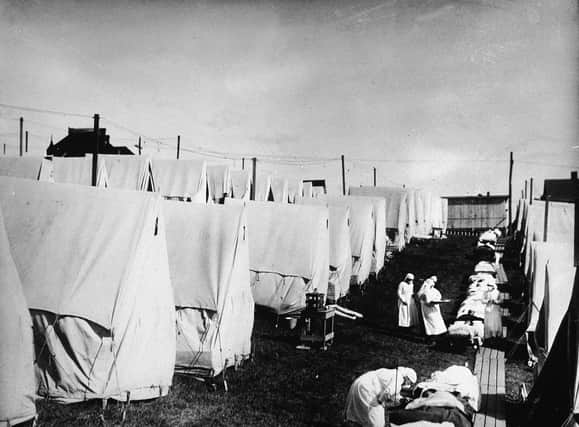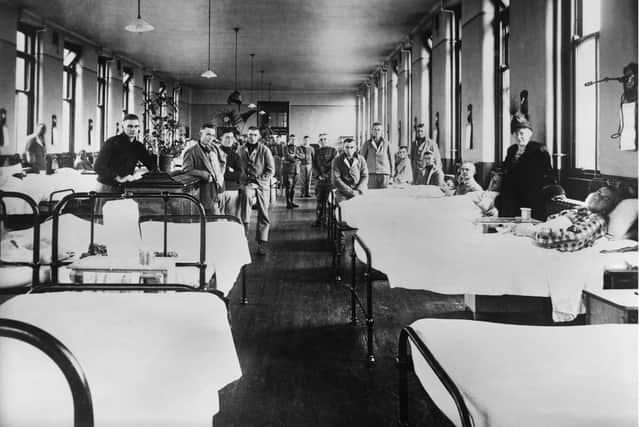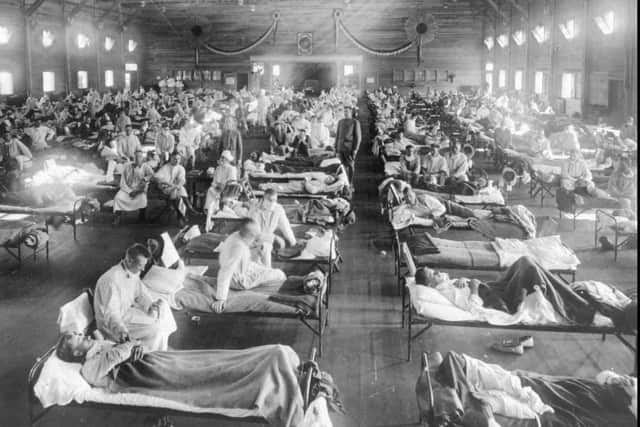The hard lessons of the Spanish Flu in Scotland and the terrors of a virus aided by silence


When it feels as if the Covid-19 era will forever be part of our personal histories, with reams of hard data and daily briefings underwriting the rolling emergency, it seems remarkable that the impact of the Spanish Flu went without any serious discussion for almost 80 years.
But back in 1918, the nation was battle weary. Morale both on the battlefields of Europe and off hung by the thinnest of threads. As a nation tried to look forward from the conflict, the pandemic fell into a national blindspot.
Advertisement
Hide AdAdvertisement
Hide AdThe reality was that the pandemic that cut through the population between May 1918 and April 1919 was an even greater global disaster in terms of death tolls than the war itself. A staggering 50 million people died worldwide.


But with information on the pandemic censored by governments still engaged in the conflict, there was little collective awareness of the scale of the health emergency.
Indeed, it was reports coming out of neutral Spain, where King Alfonso XIII fell gravely ill, that gave rise to the nickname ‘Spanish flu’ although it almost certainly didn’t originate here.
Professor Anthony Butler, honorary reader in medical science at St Andrews University, said: “Nothing was written about the subject in Britain.


"It is astonishing that one of the most significant medical events in recent history that killed far more than World War One went so unmentioned.
"No one wrote a novel or an academic study, nobody took on board how devastating it was – far more devastating than the current pandemic. Yet, there is a silence.”
Glasgow is believed to have been the entry point of the pandemic to Britain, with de-mobbed soldiers then distributing the virus to their towns, cities and villages as they made their way home to families and friends. It was meant to be time of celebration –but the flu virus also joined the party.
In the week surrounding the Armistice, there were 306 deaths in Edinburgh alone.
Advertisement
Hide AdAdvertisement
Hide AdThe virus typically attacked the young, usually in the 20 to 40 age bracket, as the heightened immune response of the fit and well ultimately attacked the organs and shut down the body.
Those feeling unwell at breakfast could be dead by night. Doctors were in short supply given GPs were often still in the battlefield.
One part of Glasgow had just four doctors for 55,000 people as the pandemic struck. Ten of the area’s GPs were at war and three had fallen ill, according to research by Prof Butler.
Bodies stacked up nationwide given the lack of gravediggers. According to the Florence Nightingale Museum, a significant number of suicides and even murders were linked back to Spanish Flu – but still no one really talked about it. It appears there was little appetite to remember in what one American academic described as a “collective amnesia” of the pandemic.
--
Spanish Flu – believed to have been transmitted to the continent either by Chinese labourers – there were 135,000 of them brought in to dig trenches – or by American servicemen.
It was the last brutal, fatal act of a time already defined by brutality and loss. Was it a God weary of war that decided to wipe out humanity with a a plague more fatal than man’s destructiveness? This was one soldier’s account of life in a camp struck by the flu, such was the despair and disbelief that a new type of horror could surround him.
The first serious take on Spanish Flu in Britain was written by medical historian Niall Johnson in 2006.Prof Butler added: “When you look at The Scotsman in November 1918, which was the peak of the pandemic in Scotland and when the influenza is raging around Europe, it’s all about fashion and motor cars. There is a story about a shortage of whisky. It is remarkable .
"World War One was so much worse than anyone had ever imagined. I believe it was felt that people could genuinely not take any more.”
Advertisement
Hide AdAdvertisement